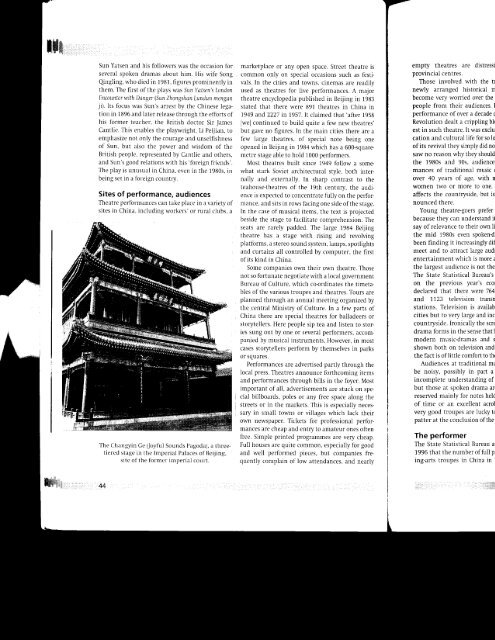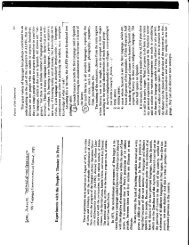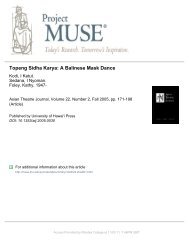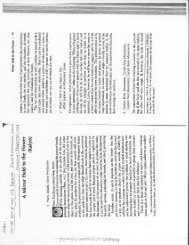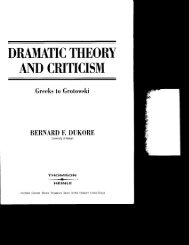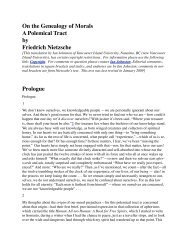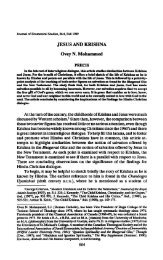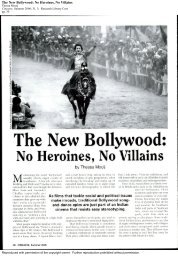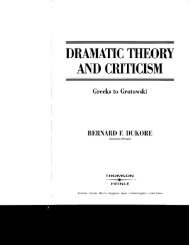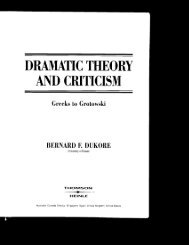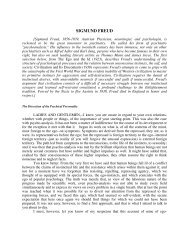Contemporary China - Yavanika
Contemporary China - Yavanika
Contemporary China - Yavanika
You also want an ePaper? Increase the reach of your titles
YUMPU automatically turns print PDFs into web optimized ePapers that Google loves.
t$e<br />
Sun Yatsen and his followers was the occasion {br<br />
several spoken drarnas about him. His wife Song<br />
Qingling, who died in 1981, figures prominently in<br />
them. The first of thc plays was Sun Yatsen's London<br />
Lnclunter with Dtrnger \Sun Zhongshan Lundun mengan<br />
ji). Its focus was Sun's arrest by thc Chinese legation<br />
in 1896 and later release through the ef'forts of<br />
his fbrner teacher, the British doctor Sir James<br />
Cantlie. This enables the playwright, Li Peijian, to<br />
emphasize not only the courage and unselflshness<br />
of Sun, but also thc power and wisdon of the<br />
British people, represented by Cantlie and others,<br />
and Sun's good lelations with his'foreign friends'.<br />
The play is unusual in <strong>China</strong>, even in the 1980s, in<br />
being set rn a foleign country.<br />
Sites of performance, audiences<br />
Theatre perfbrmances can take place in a variety of<br />
sitcs in <strong>China</strong>, including workers'ol t-ural clubs, a<br />
The Changyin Ce lfoyful Sounds Pagoda), a three<br />
tiered stage in the In-rperial Palaces o{'Bcijing,<br />
srtc ofthe former intperial court.<br />
marketplace or any open space. Street theatfe is<br />
comrron only on special occasions such as festivals.<br />
In the cities and towns, cinemas are readily<br />
used as theatres for live perfbnnances. A major<br />
theatre encyclopedia published in Beijing in 1983<br />
stated that there were 891 theatres in <strong>China</strong> in<br />
1949 and 2227 in 1957 . It claimed that 'after 1958<br />
[we] continued to build quite a few new the:rtres'<br />
but gave no hgures. In the main cities there arc a<br />
few large theatres, of special note being one<br />
opened in Beijing in 1984 which has a 600-squalenrctrc<br />
slage able to hold 1000 performcrs.<br />
Most theatres built since 1949 follow a somewhat<br />
stark Soviet architectural style, both internally<br />
and externally. In sharp contrast to the<br />
teahouse-theatles of the 19th century, the audience<br />
is expected to concentrate fully on the perfbr,<br />
nance, and sits in rows facing onc side ofthe stage.<br />
In the case of musical itcn-rs, the text is projected<br />
beside the stage to facilitate comprehension. The<br />
seats are rarely padded. The lalge 1984 Beijing<br />
thcatre has a stage with rising and revolving<br />
platforms, a stereo sound system, lamps, spotlights<br />
and curtains all controlled by computer, the first<br />
ofirs kind in <strong>China</strong>.<br />
Some companies own their own theatre. Those<br />
not so fortunate negotiate with a Iocal government<br />
Bureau of Culture, which coordinates the timetables<br />
of the various troupes and theatres. Tours are<br />
planned through an annual meeting organized by<br />
the central Ministry of Culture. In a few parts of<br />
<strong>China</strong> there are special theatres fbr balladeers or<br />
storytellers. Here people sip tea and listen to stories<br />
sung out by one or several performers, acconlpanied<br />
by musical instrurrents. However, in most<br />
cases storytellers perfbrm by thernselves in parks<br />
or squares.<br />
Performances are advertised partly through the<br />
Iocal press. Theatres announce forthcoming items<br />
and perfbrmances through bills in the foycr. Most<br />
important of all, advertisements afe stuck on special<br />
billboar-ds, poles or any free space along the<br />
streets or in the ll'rarkets. This is especially necessary<br />
in snall towns or villages which lack their<br />
own newspaper. Tickets for professional perfbrrlances<br />
are cheap and ently to anateur oncs often<br />
frec. Simple printed prograrnrres are very cheap.<br />
Full houses are quite conlmoD, especially fbr good<br />
and well performed pieces, br.rt companies frequcntly<br />
complain of low attendances, and nearly<br />
empty theatres are distress<br />
provincial centres.<br />
Those involved with the tr<br />
newly arranged historical n<br />
becone very worried over the<br />
people from their audiences.l<br />
performance of over a decader<br />
Revolution dealt a crippling bL<br />
est in such theatre. It was exclu<br />
cation and cultural life for so lo<br />
of its revival they simply did no<br />
saw no reason why they should<br />
the 1980s and 90s, audienc<br />
mances of traditional music i<br />
over 40 years of age, with n<br />
women two or more to one<br />
affects the countryside, but is<br />
nounced there.<br />
Young theatre-goers prefer<br />
because they can understand il<br />
say of relevance to their own li<br />
the mid 1980s even spokend<br />
been finding it increasingly dil<br />
meet and to attract large aud<br />
entertainment which is more a<br />
the largest audience is not the<br />
The State Statistical Bureau's<br />
on the previous year's eco<br />
declared that there were 764<br />
and 1123 television transn<br />
stations. Television is availa<br />
cities but to very large and inc<br />
countrysidc. Ironically the scr<br />
drama forns in the sense that I<br />
modern music-dramas and s<br />
shown both on television and<br />
the fact is of little comfort to thr<br />
Audiences at traditional mr<br />
be noisy, possibly in part a<br />
incomplete understanding of<br />
but lhose at spoken drama ar<br />
reserved n-rainly for notes helc<br />
of time or an excellent acro<br />
very good troupes are lucky tr<br />
patter at the conclusion ofthe<br />
The performer<br />
The State Statistical Bureaua<br />
1996 that the number of full p<br />
ing-arts troupes in <strong>China</strong> in


